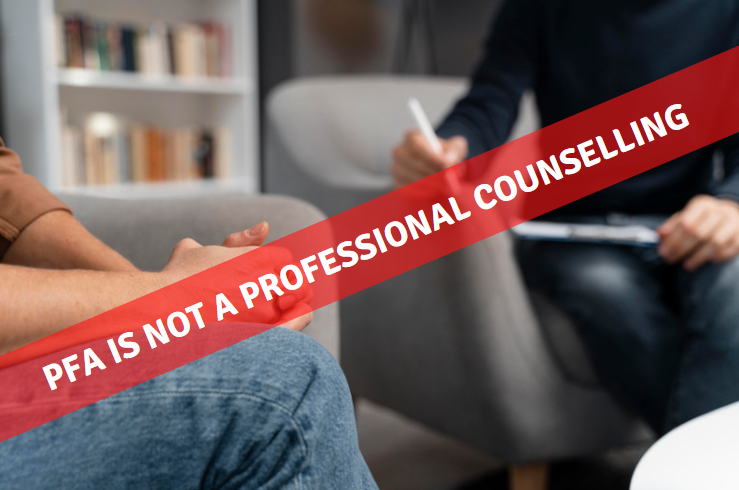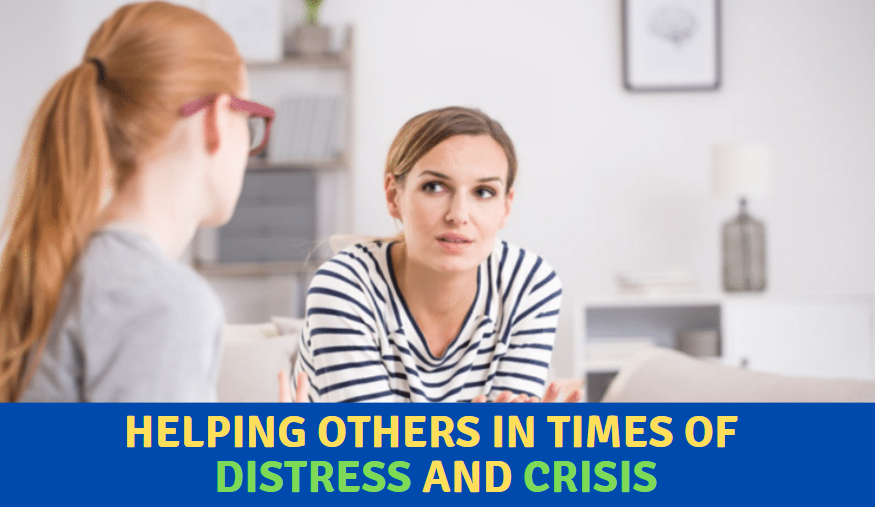What is Psychological First Aid (PFA)?
According to Sphere (2011) and IASC (2007), psychological first aid (PFA) describes a humane, supportive response to a fellow human being who is suffering and who may need support. PFA is a first-responder intervention aimed at promoting safety, stabilizing catastrophe survivors, and connecting people to support and resources. PFA is delivered to affected individuals by mental health professionals and other first responders. PFA’s goal is to assess an individual’s urgent problems and needs in the aftermath of a disaster, not to give on-site counselling.
Some of the psychological first aid that you could provide includes:
- providing practical care and support without intruding;
- assessing needs and concerns;
- helping people to address basic needs (for example, food and water, information);
- listening to people, but not pressuring them to speak;
- comforting people and helping them to feel calm;
- helping people connect to information, services and social supports;
- protecting people from further harm.
What is NOT Psychological First Aid (PFA)?

There are also common misconceptions of what psychological first aid is, therefore it is important to understand what PFA is NOT:
- PFA is not something that only professionals can do.
- PFA isn’t the same as professional counselling.
- PFA is not the same as “psychological debriefing” because it may not always entail a full explanation of the event that caused the distress.
- PFA is not asking someone to analyse what happened to them or to put time and events in order.
- Although PFA involves being available to listen to people’s stories, it is not about pressuring people to share their thoughts and feelings about an event.
Psychological First Aid is NOT about diagnosing someone’s mental state. Instead, it is about making a distressed individual feel safe, connected to others, calm and hopeful, and having access to social, physical, and emotional support.
Who is PFA for?
PFA is for persons in distress who have recently experienced a major crisis. Both children and adults can benefit from a psychological first aid. However, not everyone who goes through a crisis will want or need PFA. Don’t force help on individuals who don’t want it; instead, ensure that psychological first aid is available to those who might need it.
There may be times when someone requires advanced support than PFA can provide. Know your limitations and seek assistance from others, such as medical personnel (if available), coworkers or neighbors, local authorities, or religious and community leaders. The list of people who need medical or more immediate advanced support includes, but not limited to:
- people who have major, life-threatening injuries and require immediate medical attention
- people who are so distraught that they are unable to care for themselves or their children
- people who may harm themselves or others
How Do Crisis Events Affect People?

War, natural disasters, accidents, fires, and interpersonal violence (for example, sexual violence) are all examples of upsetting events that occur around the world. Individuals, families, or communities as a whole may be impacted. People may lose their homes or loved ones, be cut off from their families and communities, or witness violence, damage, or death.
Although everyone is affected in some way by these events, there are a wide range of reactions and feelings each person can have. Many people may be feeling overwhelmed, perplexed, or unsure about what is going on. They can be terrified or nervous, or they can be numb and aloof. Some people may have mild reactions, whereas others may have more severe reactions. How someone reacts depends on many factors, including:
- the nature and severity of the event(s) they experience;
- their experience with previous distressing events;
- the support they have in their life from others;
- their physical health;
- their personal and family history of mental health problems;
- their cultural background and traditions;
- their age (for example, children of different age groups react differently).
Every person has strengths and abilities to help them cope with life challenges. However, certain people are more vulnerable in a crisis and may require additional assistance.
This includes those who may be at risk or require more assistance due to their age (children, the elderly), a mental or physical handicap, or membership in marginalized or violently targeted groups.
When is PFA provided?
Although people may want assistance and support for a long time after a catastrophe, Psychological First Aid is designed to assist people who have recently been affected by a crisis. When you initially come into contact with someone who is distressed, you can offer PFA. This usually happens during or shortly after an event. However, depending on how long the event lasted and how bad it was, it could take days or weeks.
Where is PFA provided?
PFA can be given wherever it is safe for you to do so. This occurs frequently in communal contexts, such as at an accident scene, or in places where troubled people are served, such as health centers, shelters or camps, schools, workplaces, and food or other sorts of assistance delivery facilities. Ideally, deliver PFA in a location where you can have some privacy to speak with the person as necessary. Privacy is vital for those who have been exposed to certain sorts of crisis situations, such as sexual violence, in order to maintain their anonymity and protect their dignity.
How Can You Start to Help Responsibly?

In the wake of the Covid-19 outbreak, more Singaporeans are learning psychological first aid (The Straits Times, 2021). During the Covid-19 pandemic, a psychological first aid (PFA) course, which was introduced in 2016 to help Singapore improve community resilience and manage with national disasters, saw a higher take-up rate.
The course teaches people how to recognize signs of stress and how to help others who are afflicted, but it is not intended to replace professional counseling. Learners get basic training in recognizing indications of stress in others and how to provide emotional support by engaging with them in non-intrusive, compassionate ways.
There are many people who believed that providing emotional support is a natural ability that does not need to be learned. On the contrary, identifying the feelings someone is experiencing and knowing what to say to someone who is distressed is actually quite tough.
Psychological first aid helps save lives. Someone should be trained in every household and building (Today Online, 2021). More individuals learning skills like psychological first aid will help Singapore become a more resilient society that can bounce back more quickly after a crisis.
Useful Helplines
Samaritans of Singapore: 1800-221-4444
National Care Hotline: 1800-202-6868
Institute of Mental Health’s Mental Health Helpline: 6389-2222
Silver Ribbon Singapore: 6385-3714
Tinkle Friend: 1800-274-4788
Agency for Integrated Care Hotline: 1800-650-6060
SOS Care Text service available through Facebook Messenger on the SOS official Facebook page
Sources:

